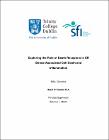Browsing School of Genetics & Microbiology by Sponsor "SFI stipend"
Now showing items 1-6 of 6
-
Consequences of exchanging the NAP-encoding genes fis and dps in Salmonella enterica Serovar Typhimurium
(Trinity College Dublin. School of Genetics & Microbiology. Discipline of Microbiology, 2020)The genes encoding nucleoid associated proteins (NAPs) are syntenic among γ-Proteobacteria, and several factors are known to impact gene expression at a given locus, including changes in gene dosage caused by DNA replication. ... -
Control of floral meristem activity in the model plant Arabidopsis thaliana
(Trinity College Dublin. School of Genetics & Microbiology. Discipline of Genetics, 2017)Over the past 30 years, the flower development has been one of the main model to study the genetic control of organogenesis in higher plants. The work on Arabidopsis thaliana has led to the proposal of the ABC model of ... -
An Exploration of Mitochondrially Targeted Gene Therapies for Ocular Disorders
(Trinity College Dublin. School of Genetics & Microbiology. Discipline of Genetics, 2020)Mitochondria play a vital role in numerous fundamental processes of the cell such as ATP synthesis, cellular signalling, reactive oxygen species production, calcium regulation and apoptosis to name but a few. Given their ... -
Novel therapeutic approaches for open-angle glaucoma
(Trinity College Dublin. School of Genetics & Microbiology. Discipline of Genetics, 2021)Glaucoma is the leading cause of blindness worldwide after cataracts and it is estimated that the global prevalence of glaucoma will increase to 111.8 million by 2040 (1, 2). Primary open-angle glaucoma (POAG) is characterized ... -
The role of death receptors in ER stress and Inflamation
(Trinity College Dublin. School of Genetics & Microbiology. Discipline of Genetics, 2018)Cell death induced in response to ER stress, particularly in response to classical ER stress-inducing agents thapsigargin, brefeldin A and tunicamycin, has been shown to be dependent on the ER stress-dependent upregulation ... -
Understanding the role of accessory components in regulation of the Polycomb Repressive Complex 2 in mESCs and cancer
(Trinity College Dublin. School of Genetics & Microbiology. Discipline of Genetics, 2022)Polycomb Repressive Complex 2 is a chromatin regulatory complex composed of core subunits EZH1/2, EED, SUZ12 and RBBP4/7, around which several accessory components assemble in a mutually exclusive manner to form structurally ...









